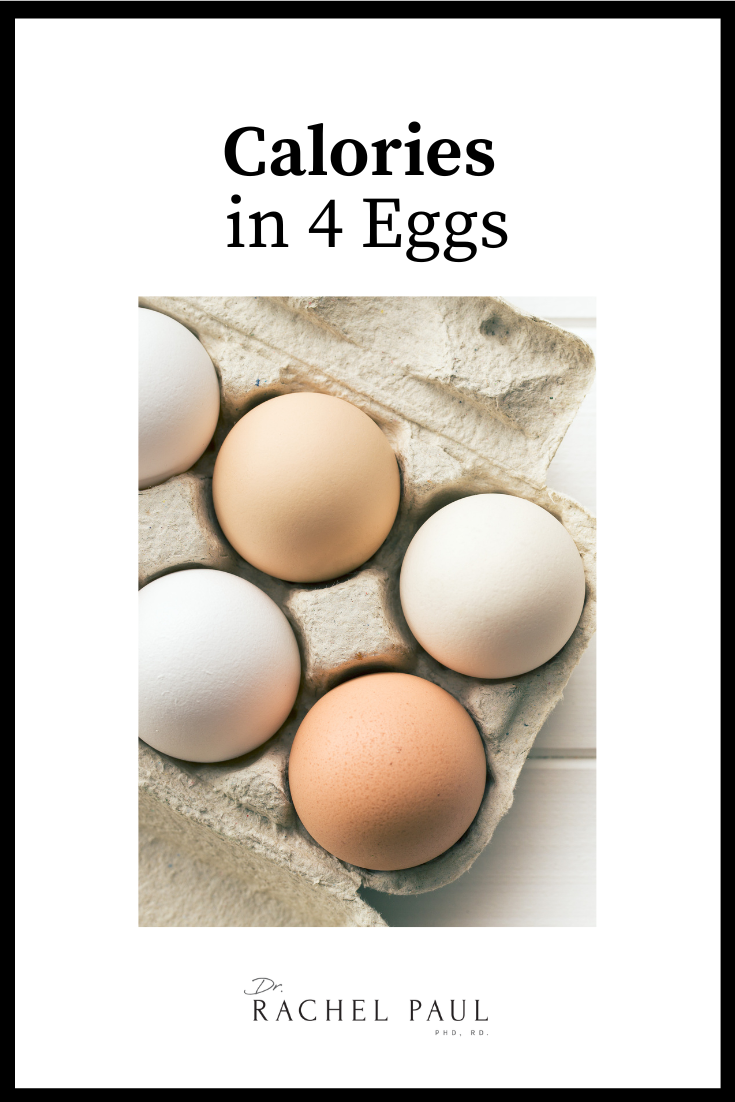Did you know? A calorie is the amount of energy required to heat 1 g of water to 1°C. In the context of dieting and food, it’s a unit of energy we get from the food and drinks we consume. It’s also the type of energy we use (“burn”) when doing any physical activity.
In order to function properly, our bodies need to meet a daily requirement of calories. All food (and drinks) we consume contain a specific amount of calories. Eggs are among the most common foods that people eat regularly because of their flavor and versatility. It can be consumed for breakfast, lunch, snack or dinner and prepared as hard boiled eggs, scrambled, in an omelet, sunny side up, in a salad, on a burger, or baked into a myriad of dishes.
Today, I’m dedicating this post to talk about the calories and nutrients you get from 4 eggs.
Calories in 4 Eggs
Eggs are the perfect go-to food item when you’re wanting to lead a more healthier lifestyle. Eating eggs has so many benefits. According to the USDA, one large egg contains only about 77 calories, 6g of protein, 5g of fat, and less than 2g of saturated fat. There’s also a good source of iron and other vitamins and minerals in eggs. Eating eggs (the whole egg and not just egg whites) is considered a top nutrient dense food.
Egg Calorie Breakdown
Eggs come in different sizes, so naturally the amount of calories found in an egg will vary depending on its size. For reference, here’s an example of a calorie breakdown by size.
- One Small egg (38 grams): 54 calories
- One Medium egg (44 grams): 63 calories
- One Large egg (50 grams): 72 calories
- One Extra-large egg (56 grams): 80 calories
- One Jumbo egg (63 grams): 90 calories
Egg Nutrition Facts
Here’s a complete breakdown of the nutrition that can be found in eating one large egg.
- Protein 6g
- Fat 5g
- Carbs 0g
Almost every essential nutrient that our body needs can be found in eggs. Eggs are high in protein and a good source of omega-3 fatty acids and vitamins A, E, D, K, and B. The majority of an egg’s essential nutrients are in the egg yolk (so don’t skimp out on just eating egg whites). The egg yolk contains choline, selenium and the antioxidants, lutein and zeaxanthin.
While it has been said that eating an increased amount of eggs could be linked with heart disease, studies done by Harvard Health report that it’s what you eat with our egg that matters.
Certain foods that are higher in saturated fats like butter, cheese, bacon, muffins, or scones raise the blood cholesterol much more than the egg itself. It’s also reported that “highly refined ‘bad carbs’ in white toast, pastries, home fries, and hash browns may also increase your risk of heart disease, stroke, and other cardiovascular diseases.”
Benefits of Eating 4 Eggs Daily
Nutrient Density
We’ve talked alot about the nutrient density that can be found in eggs. By eating 4 eggs a day, you’ll consume close to 20g of protein, and get a good source of several other vitamins and minerals, including eight of the essential nutrients all for just 70 calories per egg!
The nutrients found in eggs play a role in weight management, muscle strength, brain function, eye health and more. Eating egg whites can only, will be even less calories and without as much cholesterol (about 3.8g of protein, 17 calories per egg)!
Boost Your Immune System
Did you know? By bumping your protein intake, you can help strengthen your T cells, which can help you boost your immune system. Eggs contain an adequate amount of protein as well as other nutrients the body needs for proper immune function such as vitamin D, zinc, selenium, and vitamin E.
Versatility
Enjoy eggs for breakfast, lunch, snack, or dinner. They’re great as a salad topping, in a quiche, as a deviled egg, or omelet. The sky’s the limit. You can also see these hard boiled egg recipes for even more ideas to try to incorporate eating 4 eggs a day.
Affordable, High Quality Source of Protein
Getting an increased amount of protein in your diet can get pricey, but that’s not the case when eating eggs. Eggs offer an affordable way to get a high quality amount of protein into your diet.


